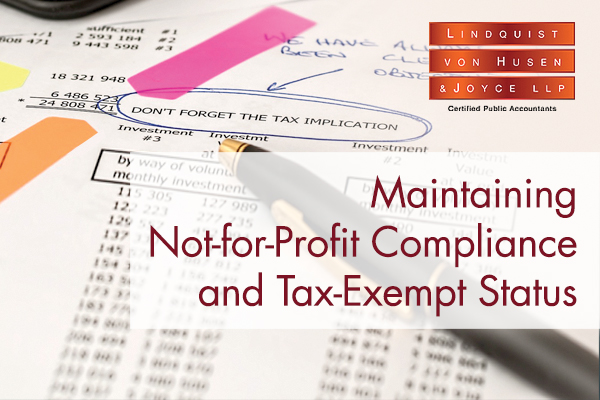
Not-for-profit organizations need to be continuously aware of what is required to maintain their tax exemption. Engaging in activities that affect this status can result in penalties called intermediate sanctions or the revocation of the organizations tax-exempt status. Here are a few areas that could put your not-for-profit’s tax-exemption status at risk:
- Earning Unrelated Business Income (UBI). Earning too much income that is not substantially related to the organization’s stated purpose can affect status. Be aware of what constitutes unrelated business income of an exempt organization and how it is taxed. Speak with a tax advisor that specializes in not-for-profits.
- Deviating from originally stated purpose. To maintain tax-exemption, an organization must be operating as it promised in its application for exemption to the IRS. If a change has occurred, the organization must notify the IRS to prevent any issues.
- Public-Private Partnerships. The activities of a partnership in which an exempt organization participates as a partner can also be viewed, in certain circumstances, as activities that are conducted by the organization.
- Private benefits. Not-for-profit organizations are prohibited from engaging in activities and events that serve private interests, including those that directly benefit board members, officers, directors and important employees of the organization. Use caution when hosting or taking part in events. When in doubt, check with your accounting or legal not-for-profit advisor.
- Engaging in political activity. Charitable non-profits that engage in “political campaign activity” are at risk of losing their tax-exemption. Political campaign activity is defined as supporting or opposing a candidate for public office on any level – federal, state and local. This is separate from lobbying or legislative activities, which are allowed but there are limitations so it’s critical to know the rules.
- Not adjusting to updated NFP accounting standards. Many changes have been enacted through FASB and the 2017 Tax Cuts and Jobs Act. Whether in the area of the new lease accounting standards or updated guidance on meals and entertainment deductions, it is imperative that organizations adhere to these changes. Not-for-profit accounting standards are complicated and your organization will benefit from working with a qualified accounting professional.
- Failing to file an annual return. Being tax-exempt doesn’t mean you don’t have to file an annual return with the IRS. Not-for-profits are required to file one of the Form 990 series of returns. Failing to file could result in revocation of tax-exempt status.
These are just a few areas that can affect an organization’s exemption status. It is helpful for every not-for-profit leader, whether a board member or staff, to be familiar with the importance of tax-exempt status and situations that put that status in jeopardy.
There are significant consequences if a not-for-profit loses tax-exempt status that include paying corporate income taxes and difficulty procuring grants. In addition, donors will no longer receive a tax deduction for their gifts to the organization which could result in significant fundraising challenges.
Even the best of intentions can land a not-for-profit in hot water. It’s important to work with advisors who understand financial accounting for non-profit organizations and who can help you navigate compliance and tax-exempt status so you can keep your organization on mission.
LvHJ’s not-for-profit tax advisors can help you understand how to maintain your tax-exempt status. Talk to us about your tax and audit needs. We serve not-for-profits in many areas, including affordable housing, social service providers, advocacy and public policy groups, private foundations, and more.








